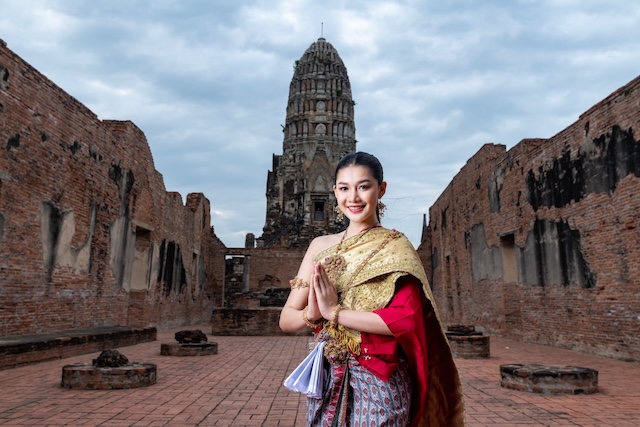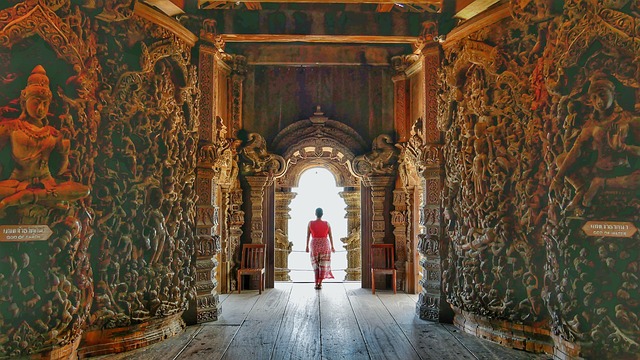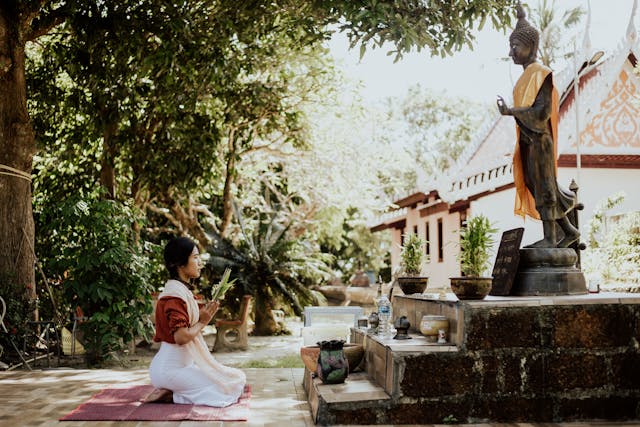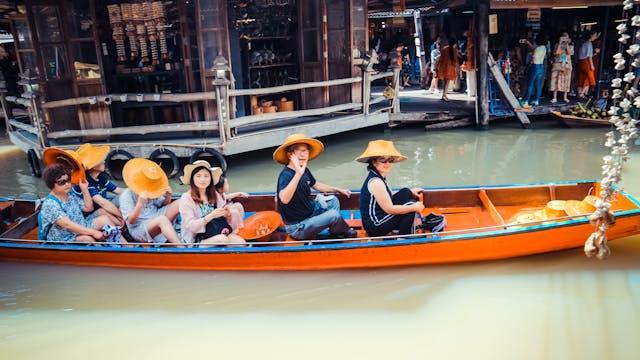Thai Etiquette Guide: Thailand is famous for its hospitality and smiles, but respecting local customs is essential for a smooth and respectful stay. This practical guide helps you understand Thai etiquette and avoid common cultural mistakes.
| Quick Summary: Do’s & Don’ts | |
|---|---|
| Do’s ✅ | Don’ts ❌ |
| Always return a Wai greeting. | Never touch someone’s head. |
| Dress modestly for temples. | Never point with your feet. |
| Remove your shoes indoors. | Never raise your voice or show anger. |
| Smile and stay calm. | Don’t make negative comments about the King. |
| Show deep respect for monks. | Women should not touch a monk. |
Mastering the “Wai,” the Traditional Thai Greeting
In Thailand, people don’t shake hands to greet each other; they perform the “Wai.” This gesture is a fundamental sign of respect in daily interactions.

How to Perform the Wai?
The Wai consists of joining your palms as if in prayer and bowing slightly. The height of your hands indicates the level of respect you are showing. For a greeting between equals or when you are unsure, joining your hands with your fingertips just below your chin is a safe option. To show more respect, especially to an older person, your fingertips should rise to the tip of your nose or to your eyebrows.
When and to Whom to Wai (and When to Refrain)?
The general rule is that the person of lower social status or the younger person initiates the greeting. It is crucial to always return a Wai if someone offers one to you first, accompanied by a smile and a slight nod. However, as a foreigner, you are not expected to Wai to children, service staff (in restaurants, hotels), or street vendors. A grateful smile is more than enough in these situations.
Respecting Body Symbolism: The Sacred Head and Impure Feet
In Thai culture, the body is governed by a very strong symbolic hierarchy that is imperative to respect.
The Head, an Untouchable Zone
The head is considered the most sacred part of the body, as it is the seat of the soul. You must never touch someone’s head, not even a child’s, as this gesture is seen as very disrespectful. Also, avoid passing objects over someone’s head.
The Feet, to Be Handled with Care
Conversely, the feet are considered the lowest and most impure part of the body. It is extremely rude to point at someone or something with your feet, or to aim the soles of your feet towards a person or a religious image.
Adopting Appropriate and Modest Attire
Thais are a modest people and appreciate proper and neat attire. Avoid walking around shirtless or in swimwear outside of beach areas, even in coastal towns. To visit temples and sacred sites, modest dress is mandatory: cover your shoulders and knees. For convenience, many major temples offer sarongs for rent at the entrance if your attire is deemed inappropriate. This is a rule never to be forgotten. Nudism and topless sunbathing are prohibited.

Being Discreet and Composed in Public
Thai culture values harmony and conflict avoidance. Speaking loudly, gesturing wildly, or showing negative emotions in public is frowned upon. Similarly, public displays of affection, like kissing, should be avoided, especially in places like temples or shopping malls.
Showing Absolute Respect for the Monarchy and Religion
Respect for the royal family is a fundamental value in Thailand, deeply woven into the nation’s identity. It is imperative to never make negative comments about the king or his family. **Current mourning protocols (January 2026) add specific dress code and behavior rules.** Understanding this context can be enriched by learning about the history of Thailand and the situation after the Queen’s passing.
Likewise, Buddhism is deeply ingrained in society. Respect religious sites, Buddha statues, and monks. Do not take disrespectful selfies with statues or turn your back on them.

Understanding Thai Etiquette at the Table
Most Thai dishes are eaten with a spoon in the right hand and a fork in the left. The fork is used to push food onto the spoon, which is then brought to the mouth. It is customary to leave a tiny amount of food on your plate to signify to your host that you are full. Now that you know the proper etiquette, you’ll feel more confident when you order food in Thailand.
Removing Your Shoes and Never Stepping on the Threshold
It is mandatory to remove your shoes before entering a home or a temple. This rule also applies to some shops and restaurants. When in doubt, observe what the locals are doing. Additionally, it is customary to step over a doorway’s threshold without stepping on it, as it is believed to be inhabited by protective spirits.
Avoiding Pointing with Your Finger
Pointing at someone or something with your finger is considered impolite. To indicate a direction or a person, use a gesture with your open hand, palm up, which is perceived as more respectful.
Keeping Your Cool and Never Losing Face
The concept of “keeping face” is central to Thai society. Getting angry in public is the height of rudeness, as it causes everyone involved to “lose face.” This means that not only do you embarrass yourself, but you also humiliate the other person, thus disrupting social harmony. In case of disagreement, staying calm and smiling will always be more effective than anger. This attitude is particularly useful for protecting yourself from common scams in Thailand.
Understanding Social Interaction Codes
Don’t be surprised if Thais ask you questions that may seem personal about your age, marital status, or profession. This is not nosiness, but a way to get to know you and determine your social status to address you with the appropriate respect. To address someone, use the title “Khun” followed by their first name; it is a polite equivalent of “Mr.” or “Ms.”
Learning a Few Polite Words
A simple effort to speak the language will always be appreciated. Here are the basics:
- Hello / Goodbye: Sawasdee krap (if you are a man) / Sawasdee kha (if you are a woman).
- Thank you: Khop khun krap (man) / Khop khun kha (woman).
To go further, feel free to learn more Thai for your travels.
Showing Special Respect to Monks
Monks are highly revered in Thailand. It is essential to show them special respect. Always give them the right of way, cede the seats reserved for them on public transport, never sit at a higher level than them, and do not point at them. The most important rule concerns women: a woman must never touch a monk or hand anything to him directly. If a woman needs to give an object to a monk, she places it within his reach so he can pick it up himself.
Bargaining with a Smile and Respecting the National Anthem
The Art of Bargaining
In markets (except for food), bargaining is part of the game. Always approach it with a smile and good humor. Haggling is not a fight, but a friendly social interaction. Aggressive bargaining will cause you to “lose face” and will be counterproductive.

Respect for the National Anthem
At 8 AM and 6 PM, the national anthem is played in public places (stations, parks, etc.). It is customary for everyone to stop, stand, and remain silent out of respect during its broadcast. Simply imitate the Thais around you.
Navigating Tipping Culture
While not mandatory, tipping is a common practice and greatly appreciated for good service. It is not an obligation, but a gesture of gratitude. Here are some general guidelines:
- Restaurants: If a 10% service charge is not already included in the bill, leaving a small tip (20-100 baht, or rounding up) is customary.
- Taxis: It’s common to round up the fare to the nearest 5 or 10 baht. For longer trips or excellent service, a larger tip is appreciated.
- Hotels: A small tip of 20-50 baht for the bellboy who carries your luggage or for housekeeping is a nice gesture.
Being Mindful with Photography
Respect for privacy and sacredness is key when taking photos. Always be mindful of your surroundings.
- People: Always ask for permission before taking a close-up photo of someone, including children. A smile and a gesture toward your camera often suffice.
- Monks: Be discreet when photographing monks. Avoid asking them to pose, as this can be seen as disrespectful.
- Sacred Places: Look for “No Photography” signs, especially inside temple prayer halls or museums. Never climb on Buddha statues for a picture.
Thai Etiquette: The Key to a Respectful Journey
Adopting these few rules of etiquette in Thailand is not just a matter of politeness, but a true sign of respect for a rich and welcoming culture. By using common sense, being open-minded, and keeping a smile on your face, you will ensure an unforgettable trip and harmonious interactions with the local population. Your effort to understand and respect their customs will be greatly appreciated. For those wishing to delve deeper into the nation’s heritage, the official Ministry of Culture of Thailand website is an excellent resource.
FAQ: Common Questions on Thai Etiquette
- What is considered rude in Thailand?
Touching someone’s head, pointing with your feet, getting angry in public, disrespecting the monarchy or monks, and wearing overly revealing clothing in sacred places are the main faux pas to avoid. - Should I return the “Wai” to everyone?
No. While it’s polite to return a Wai, you are not expected to initiate it or return it to service staff or children. A smile and a nod are sufficient. - Why is getting angry in public so serious?
Getting angry publicly causes everyone involved to “lose face.” It is a breach of social harmony, a very important concept in Thailand. Staying calm is always the best solution. - How should I dress to visit a temple?
Modest attire is required: cover your shoulders and knees. It is also mandatory to remove your shoes before entering sacred buildings.
🔄 Last updated on January 16, 2026
